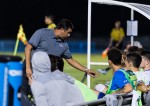Nneoma Kanu was not accepted the first time she applied to UCLA.
She was a second-year accounting student at College of San Mateo, a community college in Northern California. She said she was disappointed but knew it would take more than just good grades to get into the top public university in the country.
Kanu said she worked even harder the next year, interning at two companies and studying to make sure her grades were up to UCLA standards – all while working part time at the library and playing volleyball on the school’s team. The next time she applied to UCLA, she was accepted.
“At first I didn’t believe it – I was in shock,” she said. “I felt like all my work and effort paid off.”
Then, she found out about the admissions scheme uncovered Tuesday, in which parents paid hundreds of thousands of dollars to a UCLA soccer coach to secure their children’s spots at the university.
Kanu said she felt like it minimized all of the hard work she put in at community college.
“It shouldn’t be a matter of how rich you are, but it kind of is,” she said.
This is not the first time UCLA has garnered national attention over an admissions scandal. In 1996, it was discovered that UCLA accepted hundreds of well-connected, wealthy applicants ahead of those with better qualifications and test scores, according to a Los Angeles Times article. The university had raised millions of dollars in private funds through these back-channel requests.
In the most recent admissions scheme, parents gave $25 million to third-party college preparation businesses that helped their children cheat on standardized tests. The scheme also helped students gain admission to prestigious colleges as student-athletes despite never having played their respective sports competitively.
For some, the scheme draws attention to the privileges many wealthy high school students enjoy while applying to college.
Erika Gallion, a UCLA student affairs officer, said she struggled to navigate the college admissions and financial aid process at Ashland University as a first-generation college student. Learning about the scheme was a slap in the face for anyone who values equity in admissions, she said.
“I know how students can feel intimidated by the application process, and now it might feel even more hopeless and daunting, like you’re already disqualified from the experience,” she said. “That’s going to be the hardest part, in assuring potential students and even current students that everyone has an equal shot.”
Kenneth Vuong, a first-year mechanical engineering student, came from a low-income family and used financial aid to cover the cost of his college applications. He said his family would never have been able to afford to bribe a coach.
“If I hadn’t been the best at my school, UCLA wouldn’t have accepted me,” he said.
Others said the admissions scheme validated what they already knew to be an unequal system.
“It just shows a huge advantage that rich people have over less wealthy people in the context of college admissions,” said Danny Cross, a first-year political science student. “Everyone knows this inequality exists, but it is embarrassing to see it happening here at UCLA.”
Theodore Porter, a distinguished professor of history at UCLA, said the scheme draws attention to a problem that has been going on for years.
“It’s not only a UCLA problem. It’s a problem with the whole American system of education,” he said. “This kind of thing certainly shows that the American system is not clearly meritocratic and that it gives advantages to people who already have privileges.”
Olivia Modi, a first-year biochemistry student at UC San Diego, was waitlisted at UCLA in 2018. She took 11 AP classes, served as the president of her school’s Science Olympiad team and tutored at the local middle school.
“There are a lot of people who I’m sure are deserving to get in, and knowing that someone got in because they paid their way through is a little disheartening,” she said.

Lol, in my time all you`ve got to do just be smart. And always do your homework.
I don’t ever want to here anything about affirmative action again.
Nice post
If you are looking for an online homework helper that is gentle to your pocket .
visit blogs for E-learning is here .
Nice post
If you are looking for an online homework helper that is gentle to your pocket . Your best home work expert is here.visit our blogs at https://helpacads.com/subjects/